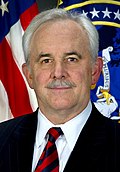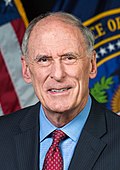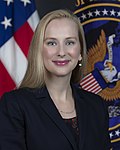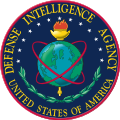| Director of National Intelligence | |
|---|---|
 Seal of the director of national intelligence | |
 Flag of the director of national intelligence | |
| Office of the Director of National Intelligence | |
| Style | Madam Director (informal) The Honorable (formal) |
| Member of | Cabinet National Security Council Homeland Security Council |
| Reports to | President of the United States |
| Seat | Washington, D.C. |
| Appointer | The president with Senate advice and consent |
| Constituting instrument | 50 U.S.C. § 3023 |
| Precursor | Director of Central Intelligence (DCI) |
| Formation | April 21, 2005 |
| First holder | John Negroponte |
| Deputy | Principal Deputy Director of National Intelligence (P/DDNI) |
| Website | www |
The director of national intelligence (DNI) is a cabinet-level United States government intelligence and security official. The position is required by the Intelligence Reform and Terrorism Prevention Act of 2004 to serve as executive head of the United States Intelligence Community (IC) and to direct and oversee the National Intelligence Program (NIP). All 18 IC agencies, including the Central Intelligence Agency (CIA), the Defense Intelligence Agency (DIA) and the National Security Agency (NSA), report directly to the DNI. Other federal agencies with intelligence capabilities also report to the DNI, including the Federal Bureau of Investigation (FBI).
Contents
- History
- Founding
- Appointments
- Website issues
- Reform initiatives
- Office of the Director of National Intelligence
- Organization
- United States Intelligence Community
- Line of succession
- Lists of personnel
- List of directors
- List of principal deputy directors of national intelligence
- List of chief operating officers
- List of directors of the intelligence staff / chief management officer
- List of inspectors general
- List of deputy directors of national intelligence
- Assistant directors of national intelligence
- See also
- References
- Further reading
- External links
The DNI also serves as the principal advisor to the president of the United States, the National Security Council, and the Homeland Security Council on all intelligence matters. The DNI, supported by the Office of the Director of National Intelligence (ODNI), produces the President's Daily Brief, a highly classified document including intelligence from all IC agencies, shared each morning with the president of the United States. [1] The DNI, who is appointed by the president of the United States and is subject to confirmation by the United States Senate, serves at the pleasure of the president.
President George W. Bush strengthened the role of the DNI on July 30, 2008, with Executive Order 13470, [2] which, among other things, solidified the DNI's legal authority to direct intelligence gathering and analysis, and to set policy for intelligence sharing with foreign agencies and for the hiring and firing of senior intelligence officials. [3] The DNI was given further responsibility for the entire IC's whistleblowing and source protection by President Barack Obama via Presidential Policy Directive 19 on October 10, 2012.
The position was elevated to a cabinet-level role during the first presidency of Donald Trump and retained this status in subsequent administrations. Currently, the DNI attends all cabinet meetings and liaises with the executive office of the president and other Cabinet secretaries in the execution of their duties. President Donald Trump nominated Tulsi Gabbard to the position in 2025, and she was subsequently confirmed by the US Senate on February 12, 2025. [4] [5]























